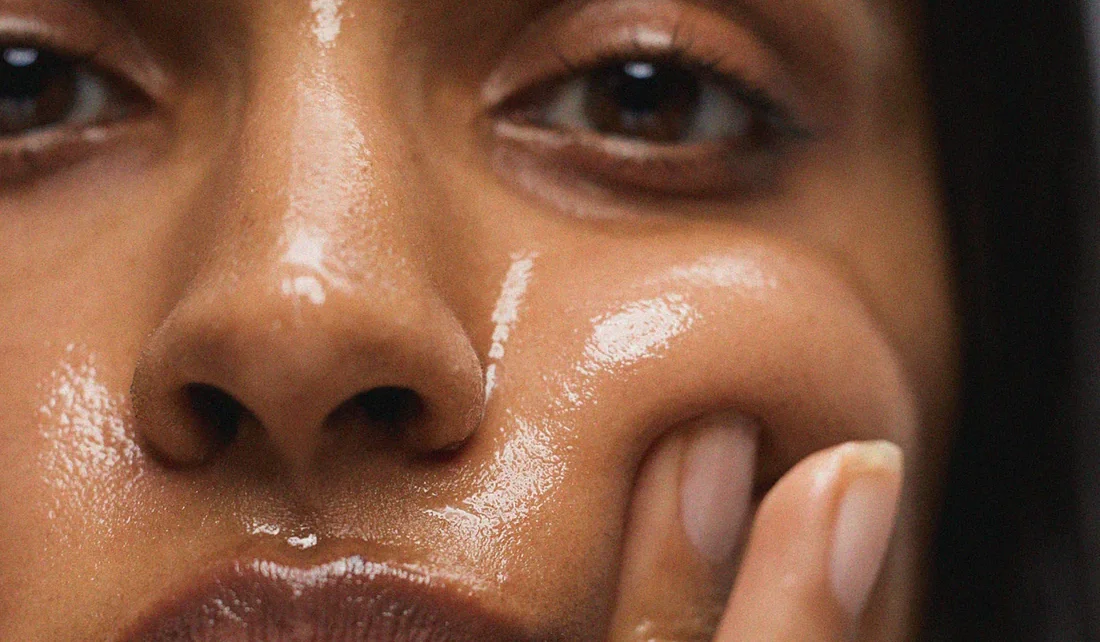Your hormones play a crucial role in the appearance and health of your skin. Hormonal fluctuations can trigger skin issues such as acne, blemishes, redness and hyperpigmentation.
Estrogen stimulates collagen production, skin elasticity and helps with moisture retention. However, lower levels of estrogen can lead to skin dryness and the appearance of fine lines and wrinkles.
Estrogen
One of the most well-known effects of hormones on skin is a change in the amount of sebum produced. Estrogen has been shown to suppress the production of sebum in the sebaceous glands, and this is why many women notice their oily skin is worse during certain periods of their menstrual cycle.
At the same time, however, androgens (male sex hormones) can also bind to receptors in the sebaceous glands and stimulate excessive oil production. This can lead to acne or hirsutism, where the body produces excess male-pattern hair on the face and chest (3,4).
Another hormonal effect of estrogen is a reduction in fine lines and wrinkles. This can be attributed to lower levels of the oestrogen ligands that encourage the growth of collagen (2,5).
Progesterone
Progesterone is the second major sex hormone that fluctuates during menstruation. It closes skin pores and causes sebum buildup beneath the surface of your skin. (1)
Like estrogen, progesterone is a steroid hormone that’s made in the ovaries (with help from the adrenal glands). It’s derived from cholesterol through double oxidation to 22R-hydroxycholesterol and 20a-deoxy-cholesterol, which are converted to pregnenolone and then to progesterone by enzymes.
Progesterone plays a critical role in the luteal phase of the menstrual cycle and in pregnancy, where it’s known to stabilize the uterus for embryo implantation and suppress uterine contractions to prevent preterm labor. Progesterone also helps prepare the mammary glands for breastfeeding and promotes breast development. (3).
Testosterone
Testosterone is a hormone found in men and women, although it is produced in lower amounts in women. It helps regulate sex drive, promotes sperm production and increases muscle strength and bone density. A healthy level of testosterone is also associated with a sense of well-being.
Testosterone stimulates androgen receptors, which can lead to an increase in sebum (the oily substance that keeps skin lubricated). This is why people going through puberty often have oilier skin than adults.
Conditions that affect testosterone levels like polycystic ovary syndrome in women or hypogonadism in men can cause androgen levels to rise, which may result in increased oil production and an increase in acne and other skin issues. This is why it’s important for people on TRT to understand how hormonal fluctuations impact their skin health.
Cortisol
Often referred to as the “stress hormone,” cortisol is produced by the adrenal glands in response to stress. Cortisol helps your body cope with a threat or emergency by slowing down functions that are unnecessary for survival, including the digestive system, reproductive systems and growth processes. Cortisol also changes immune system responses to protect you from a harmful or overly sensitive response.
But if you have chronically elevated cortisol levels, these can exacerbate skin conditions such as eczema and psoriasis. This is why stress management is so important for your skin at any age or hormonal stage of life. A balanced diet and regular exercise can help manage your cortisol levels. In addition, medications like oral contraceptives and spironolactone can help get your hormones back into balance if you have polycystic ovary syndrome (PCOS). This may reduce excess androgen production and help with oily skin, acne, and unwanted hair growth.
Thyroid Hormones
While thyroid hormones are best known for controlling metabolism, they also have an effect on skin. An imbalance in thyroid function can cause dryness, changes in skin texture, and even acne outbreaks. Androgens can increase sebum production, leading to oily skin and breakouts, especially at specific times during the menstrual cycle, as well as hirsutism (unwanted male-pattern hair growth).
Your thyroid hormones are controlled by a self-regulatory system that begins in your hypothalamus. The hypothalamus secretes thyrotropin-releasing hormone, which stimulates part of the pituitary gland to release thyroid-stimulating hormone (TSH). TSH in turn stimulates your thyroid to release thyroxine and triiodothyronine into the bloodstream. This is why it’s important to have a balanced diet to help maintain healthy thyroid function. This is particularly important if you have a condition like hyperthyroidism that causes too much thyroid activity.





